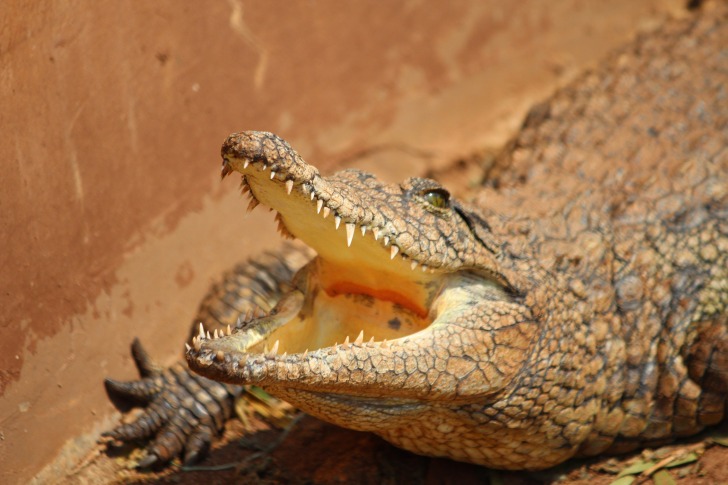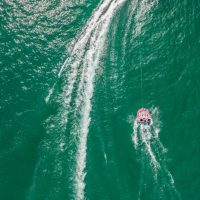Alligators are cold-blooded.
They love warmer climates – and Raleigh, North Carolina can be quite warm during various parts of the year.
With so many bodies of water offering freshwater and plenty of food for alligators, they may easily lurk within the shallow waters and throughout the marshes.
Knowing if they are in various parts of Raleigh is critical to your safety.

Contents
- So… Are There Alligators in Raleigh, North Carolina?
- Alligator Species in Raleigh, North Carolina
- Is It Safe to Swim in Raleigh, North Carolina?
- Interesting Alligator Facts in Raleigh, North Carolina
- Alligators vs. Crocodiles
- 3 Safety Tips for Swimming in Alligator-Infested Waters
- Summary
- Raleigh Safety Overview
- Frequently Asked Questions
So… Are There Alligators in Raleigh, North Carolina?
The natural habitat for alligators includes most of the southern U.S., including North Carolina.
When you look at Raleigh specifically, there have been countless reports of alligators being found in the various bodies of water.
The Triangle, which is defined as Raleigh-Durham-Chapel Hill, has had more alligator sightings in the past decade than in previous decades. This shows that many alligators may be migrating north.
On average, Raleigh doesn’t experience any jarring winters like further north.
Lakes aren’t going to freeze, which means that alligators are able to live through the entire year.
Alligators aren’t always in bodies of water, either.
One was seen blocking traffic in Brunswick County.
Another was removed from a neighborhood in Hanover County.
Orton Pond is a 500-acre lake that is located south of Wilmington.
There are at least 80 alligators living there – and that’s estimated to be double the population that it was in 1980.
Most of the state’s alligators live in the southeastern corner, such as where you’d find Orton Pond.
That being said, if alligators feel threatened, they will leave the body of water they have been living in to search for someplace new.
While it’s not common to find a large number of alligators in any of the bodies of water in Raleigh, they are there – and it’s becoming more common than it was 20 years ago.
If you really want to see an alligator, you’d be better off checking out the reptiles at the North Carolina Zoo.
Alligator Species in Raleigh, North Carolina
There are only two species of alligators found within the entire world – the Chinese alligator and the American alligator.
Unless you are visiting a zoo, you won’t find the Chinese alligator outside of China.
The American alligator has been known to live in various bodies of water throughout Raleigh, North Carolina.
The reality is that they have been found all throughout the southern U.S., from Texas all the way up to North Carolina.
You won’t find the crocodile in Raleigh outside of a zoo, either.
The crocodile prefers saltwater.
The American crocodile can be found in South Florida as well as throughout various parts of Central America.
Since the only member of the Crocodilia family in Raleigh is the American Alligator, you’ll want to familiarize yourself with it.
The male adults are larger than the female adults, growing to be about 12 feet in length.
They can also weigh in at about 800 pounds.
Is It Safe to Swim in Raleigh, North Carolina?
Swimming in Raleigh can be completely safe, but it depends on the body of water that you want to swim in.
Some of the most popular places to swim in Raleigh include:
- Lake Johnson Park
- Lake Crabtree County Park
- Shelley Lake Sertoma Park
- Falls Lake Recreation Area
The North Carolina Wildlife Resource Commission does a great job of making sure that it knows what is and isn’t in all of the parks – especially when it comes to those where swimming is advertised as one of the recreational activities.
If there have been any reports of alligators, they will add signage around the swimming areas.
You’ll want to stay toward all of the designated swim areas.
If you have to wade through thick/tall grass to enter the water, it’s not a good idea.
One, it’s likely not “designated” as a swimming area.
Two, the tall grass is where alligators are likely to drop their eggs – and you most certainly don’t want to wade through a breeding area for alligators.
There are other concerns in Raleigh, too.
During certain times of the year, water pollution can be problematic.
It can lead to various health problems if you ignore the cautions and enter the water anyway.
The park websites will usually tell you if the water levels are safe.
Drowning has also been problematic. Some of the lakes in Raleigh are deeper than many realize.
Exercise extreme caution and don’t swim out too far, especially if you’re not a seasoned swimmer.
None of the state or county parks have lifeguards on duty, so it is always a “swim at your own risk” kind of situation.
Interesting Alligator Facts in Raleigh, North Carolina
There are all sorts of alligator facts in North Carolina – and Raleigh specifically.
Alligators typically won’t migrate as inland as Raleigh, which is why alligator sightings are not impossible but still fairly rare.
Some alligators that are found in the wild may actually be those that were released as pets.
North Carolina is one of four states where there is no state-wide ban on exotic animals as pets.
This means that with the right permitting, it is entirely possible for someone to have a pet alligator.
And if that gator gets too large, someone may release it – although this practice is actually illegal.
One of the last times that an alligator was caught and euthanized in Raleigh was back in 2014.
A man was fishing at Falls Lake, near the Falls Lake Recreation Area.
He ended up hooking an alligator and calling the NC Wildlife Resources Commission.
Due to the size of the gator, it ended up being euthanized.
There’s another reason why the population is generally under control.
Alligator hunting was made legal in North Carolina back in 2018.
All you need is a permit.
If you catch an alligator, you can enjoy the meat – the alligator game is considered to taste a lot like chicken – and there are quite a few butchers that will pay good money in Raleigh if you bring in a full-sized gator.

Alligators vs. Crocodiles
Alligators and crocodiles are both considered crocodilians based on being members of the Crocodilia family.
They have a number of similarities including eating fish, birds, and small mammals as well as swimming in the water and spinning their prey.
There are quite a few differences in their appearance.
Alligators are black or gray and have rounded snouts.
When their jaws are closed, you won’t see any of their teeth – and they have more teeth than the crocodile.
The crocodile, meanwhile, is green or brown with pointed snouts.
When their jaws are closed, you will still see some of their bottom teeth.
Additionally, they have slightly longer legs.
Crocodiles enjoy saltwater because they have salt-excreting glands.
Alligators don’t have these glands, so they’re more likely to be in freshwater or brackish water.
They prefer marshes and swamps but will also go into creeks, rivers, and lakes.
Crocodiles are generally seen as the more aggressive of the two, though alligators will most certainly attack if they feel as though they are in danger.
It is also important to know that while both are aquatic, alligators have webbed feet, making them the faster swimmers.
3 Safety Tips for Swimming in Alligator-Infested Waters
Most alligator-infested waters aren’t designated swimming areas, which means that you shouldn’t be in the water.
However, if you assume that there are alligators in the water or insist on going into the water no matter what, there are a few safety tips that you should follow.
- Don’t Swim Alone
The more activity there is in the water, the more likely alligators will keep their distance. Additionally, swimming with others will ensure that there is someone who can call for help in the event that an alligator does attack. - Follow All Signs & Notifications
Most bodies of water will post warnings to tell you if there are alligators or other dangers. If you’re not sure, check the city or park website to confirm if there are any cautions that you need to heed. - Avoid Swimming from Dusk to Dawn
Alligators tend to be more active during the nighttime hours. If you splash around at night, the gators could easily mistake you for prey and attack. Ideally, if you’re going to be in the water where alligators live, do so during the day so that you can see them, and they can see you.
Summary
Alligators are often at the top of their food chain with only men being above them.
If they are found in any body of water where you are, there’s the potential for an attack – even though it’s entirely possible to fight and get away from an alligator, too.
Raleigh is in the northern part of North Carolina and significantly inland, which means that alligator sightings aren’t terribly common.
There aren’t large populations of alligators living in that part of the state.
It doesn’t mean it’s impossible to see an alligator, just rare.
Still, the state does monitor the various types of animals, including alligators, occupying the various bodies of water.
If there is any concern about an alligator being in a lake, you are likely to hear about it before you ever see one on your own.
Raleigh Safety Overview
READ THE FULL REPORT: Raleigh Safety Review
Safety Index:
- OVERALL RISK: LOW
- TRANSPORT & TAXIS RISK: LOW
- PICKPOCKETS RISK: MEDIUM
- NATURAL DISASTERS RISK: MEDIUM
- MUGGING RISK: LOW
- TERRORISM RISK: MEDIUM
- SCAMS RISK: LOW
- WOMEN TRAVELERS RISK: LOW
Frequently Asked Questions
Alligator-related deaths are not common, especially in Raleigh.
Most of the deaths occur in Florida and are usually a result of provoked attacks.
Approximately 10 people die in the U.S. every year due to alligator attacks.
What is the average lifespan of an alligator?
An alligator has the potential to live 30 or 40 years as long as it does not reach any kind of harm.
Many adult alligators can reach considerable lengths and weights as they get older, which is why older alligators tend to be more dangerous.
Where is the most alligator-infested lake in the United States?
Lake Jesup is considered to be the most alligator-infested lake in the United States, which is located in South Florida.
It has been estimated by conservation officials that there are 13,000 gators of varying sizes living in and around the lake.
How do you fight to get away from an alligator?
If you find yourself being chased by an alligator, run as fast as you can.
While alligators can run fast right out of the water, they lack endurance.
After the first several hundred feet, you are likely to have the lead.
If you can’t outrun the gator, hit it on the snout with whatever you have – an oar or a branch, for example.
This area is extremely sensitive and will stun the gator while you make your getaway.












Alligators are fascinating creatures, but it’s important to remember that they are wild animals and should be treated with caution and respect.